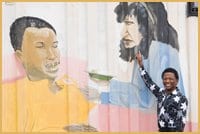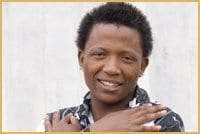
A NATURAL NURTURER. 'My mom has been diabetic since I was a child and I took care of her. Other people said, 'You have sisters to do this.' But it was inside me to be a caregiver,' says Pheello Shai. Credit: Tallulah photo
Pheello Shai stands out in a group of female AIDS workers, not only because he is the sole man, but because he is obviously and unapologetically gay.
And in Soweto, South Africa, that’s a big thing.
Shai, 24, is the only male employee at the Soweto Home —Based Caregivers Co —operative (SHBCC) an organization formed in 1998 that provides free palliative care to those who are suffering from AIDS.
Shai and his colleagues are having an intense discussion in the small, pre —fabricated building that serves as office, kitchen and meeting room for the group. There is a looming financial crisis at the SHBCC; funding from one of its two Canadian supporters runs out this year, and the workers are brainstorming possible new sources of money.
In the past, funding for both salaries and operating expenses has come from the Ottawa —based Canadian Co —operative Association (CCA), which promotes the development of credit unions and co —ops around the globe. The Primate’s World Relief and Development Fund (PWRDF), a faith —based organization, is planning to continue support of the SHBCC in 2008; however, its monthly stipend is tiny and does not come close to covering workers’ salaries.
Dressed in a black cotton shirt with stylized white flowers, tight blue jeans, black pumps and lilac eye shadow, Shai discusses the frustrating situation with me afterwards. Finding funding has always been difficult for this 10 —year —old organization, and Shai worries what might happen to his clients, many of whom are bedridden, should the SHBCC be forced to cut back its services or even shut down.
Shai also worries what will happen to his own family.
His salary is 750 rand a month, which is equal to about $100. This money helps support his disabled, diabetic mother and his two sisters, with whom he lives. Shai also uses his wage to buy food — maize porridge and vegetables — to take to many of his poverty —stricken patients.
Soweto is arguably the centre of the global AIDS pandemic; about 20 percent of the city’s 3.5 million populace — or 700,000 people — are HIV —positive, according to government statistics. The afflicted are ill with the opportunistic diseases associated with AIDS, such as tuberculosis, meningitis and pneumonia.
The national infection rate is 5.8 million people and the South African Medical Research Council reports that 71 percent of deaths among those aged 15 to 49 are caused by the virus.
There are few palliative care organizations in the city, and many of the ill suffer alone with little or no food in the tin —roof backyard shacks that dominate Soweto’s suburban sprawl.
Soweto, located just outside the industrial city of Johannesburg, is an acronym for South Western Townships and was established in the early 1900s to house South Africa’s black workers: diamond and gold mine workers and domestic servants for the minority white ruling class.
Soweto became the heart of the anti —apartheid movement and spawned activists like Nelson Mandela and Archbishop Desmond Tutu, who fought for human rights and a democratic state starting in the 1960s. Like all South Africans, Shai has great reverence for Mandela, who turned 90 this month.
“Mandela has opened so many doors for us all,” says Shai.
Mandela, who led the fight against apartheid even during his 27 —year prison sentence under the white regime, became president in 1994 in South Africa’s first multiracial election. Under the new constitution, South Africa became one of the first countries in the world to outlaw discrimination on the basis of sexual orientation.
Tutu, a Nobel Peace Prize winner (as is Mandela), declared homophobia “every bit unjust” as apartheid.
In 2002, the High Court in Bloemfontein ruled that denying same —sex couples the right to marry was unconstitutional. Four years later, South Africa became the first African country to make same —sex marriage legal, a year after Canada granted this right to gays and lesbians.
The idealism that gripped South African society during these heady years of freedom helped make Shai’s coming out in high school relatively easy; his family supported him and he wasn’t bullied by fellow students.
Still, it took many years of soul —searching as a child growing up before he was ready to take this momentous step.
One of Shai’s earliest friends was a young lesbian who lived nearby. The pair spent many hours talking together, trying to understand who they were and what was different about them. “She gave me the courage to express myself as a gay individual in society,” Shai recalls.
Shai developed a sense of self —respect as result. During his high school years Shai also met a revered gay AIDS activist who made him realize the importance of being involved in the community. Shai is now an active member of the gay community in Soweto and a long —time participant in a gay netball team, which plays in a straight league.
He also organizes meetings, support groups and information dissemination for the Lesbian, Gay, Bisexual, Transsexual and Intersex (LGBTI) organization, and plans to start his own group with educational and outreach programs and counselling for gays and lesbians not currently available in Soweto.
The need for information and support is great. Despite the leap to tolerance from oppression, South Africa remains a staunchly patriarchal society with deeply entrenched customs of machismo and polygamy, both significant factors in the continued spread of AIDS in that society. Legally, men can have more than one wife. They often have several girlfriends as well and consider condom use unmanly.
In such a society, Shai realizes how much of a trailblazer he is. Not only is he proudly gay, but he also embodies the traits that, in South Africa, are considered uniquely feminine.
In South Africa, gender is a major dividing line when it comes to the nurture and care of the ill and elderly; traditionally, this is women’s work. Most men would refuse Shai’s job, which is not considered masculine, he says.
Shai was a nurturer from early on. “I have loved this career as a choice since childhood. My mom has been diabetic since I was a child and I took care of her. Other people said, ‘You have sisters to do this.’ But it was inside me — this foundation of love — to be a caregiver,” Shai says.
Today Shai takes care of 43 AIDS patients with devotion and professionalism, travelling to their homes by bus, ensuring that they are taking their medicine, monitoring possible side —effects, bathing and feeding them and helping get them to the doctor.
Shai has only three gay patients; unlike North America, AIDS in Africa primarily affects heterosexuals.
Shai is also an educator; he advocates condom use and is strict about using condoms himself. “Practice what you preach,” he smiles.
He also gets an HIV test three times a year, another practice differentiating him from most of his male peers. Few men in this predominantly Zulu culture acknowledge the danger and ubiquity of AIDS. Many refuse to be tested for the virus even if they start to show signs of illness, Shai says.
Unfortunately, South Africa’s embrace of modernity and the trappings of a free and democratic society seem to have taken a big step backwards, due largely to leaders who are failing to uphold the honour and idealism of men like Mandela and Tutu.
President Thabo Mbeki blocked government distribution of anti —retroviral (ARV) drugs, which reduce the viral load of HIV, after succeeding Mandela in 1999. Mbeki claimed that AIDS was a racist conspiracy engineered by Western pharmaceutical companies. Eventually bowing to international and national pressure, ARV distribution began in 2004, after many thousands of people had died of AIDS.
Meanwhile, Jacob Zuma, the 65 —year —old leader of South Africa’s ruling African National Congress (ANC) party, was acquitted two years ago on charges of raping a 31 —year —old family friend. Zuma admitted in court that he had unprotected sex with the woman, whom he knew to be HIV —positive, but took a shower afterwards to prevent contracting the virus.
Shai says ignorance of this scope is found at many levels of South African society, not only among its current leadership.
Strangers are rude to Shai, calling him a derogatory term for gay — “moffie.” He also recalls walking home one night with a friend about a year ago when two men came at them out of the dark, brandishing knives. “You’re gay,” the men hissed, pointing the knife tips towards the throats of Shai and his friend. “You must have money. Hand it over!”
Shai’s screams of fear brought local residents running out of their homes, and the would —be thieves ran off. In hindsight, Shai feels that he was picked on not just because of homophobia, but because of the stereotype that gays have more money than the average South African.
Homophobia has fuelled several brutal rapes and killings in the last few years as well. Last July, Soweto lesbian couple Sizakele Sigasa and Salome Masooa were murdered execution style by gunshots to the head after being raped and tortured.
Sigasa lived openly as a lesbian and was an advocate for people living with HIV/AIDS. Gay rights organizations said the killings were driven by “lesbophobia.”
In South Africa, being a lesbian may be even more dangerous than being gay. Rape and violence against all women — not just lesbians — is common, with statistics citing one rape of a woman every 26 minutes in South Africa.
Zanele Muholi, a prominent lesbian rights group advocate and photographer in South Africa, says the problem can be traced to the cultural patriarchy. Men who perpetrate such crimes see rape as a way to assert their superiority over women in society, Muholi says.
South Africa, indeed, is a paradox. While it has shown significant leadership and enlightenment when it comes to minority rights, homophobic elements are glaringly evident among even the highest echelons of power.
Zuma further stirred controversy in South Africa when he condemned same —sex marriages, calling them “a disgrace to the nation and to God.” He also stated that, “when I was growing up, a ‘ungquingil’ (homosexual) would not have stood in front of me. I would knock him out.”
South Africa is a difficult and challenging place to live with rampant AIDS and dire social and economic problems. Still, Shai dares to dream. He imagines, first, a day when AIDS no longer exists.
He also imagines marrying his long —time partner, Robert Moloto. Shai would wear the bride’s dress; he envisions a full —length gown of cream and gold brocade. The couple would adopt orphaned children.
Shai would become a beauty consultant, applying his nurturing nature to things that give people pleasure, such as massages, manicures and pedicures.
For now Shai’s dreams remain out of reach; just something to occupy his mind as he rides the bus through the streets of Soweto to care for his next patient.

 Why you can trust Xtra
Why you can trust Xtra


